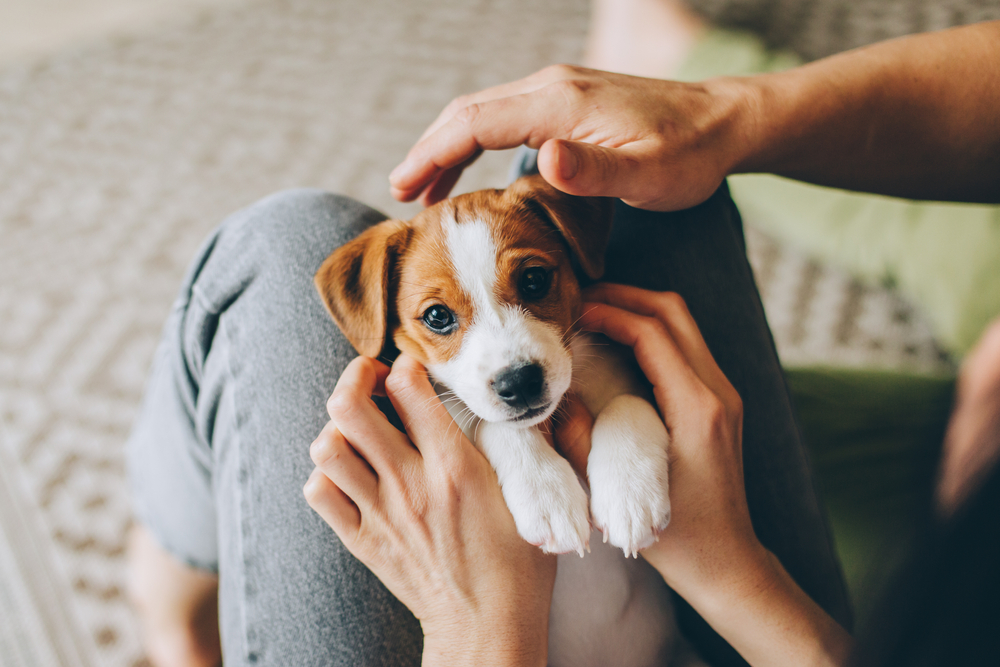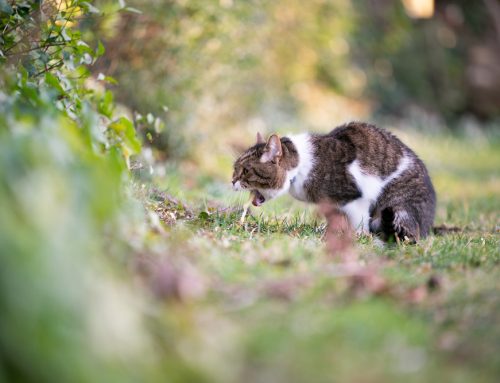Nothing is better than adopting a puppy—their big, innocent eyes, cute floppy ears, and precious rolls—but, of course, raising a puppy is also a big commitment. You are not alone in feeling a bit overwhelmed at puppy parenting’s responsibilities, and the first year can be especially challenging as you navigate puppyhood’s milestones and the ups and downs. To ensure your puppy’s first year is a success, read our Tamberly Animal Hospital team’s do’s and don’ts regarding the care of your young roly-poly pet.
DO puppy-proof your home
Before bringing home your new puppy, take some time to ensure the environment and your belongings remain safe. Puppies are curious and eager to explore their surroundings—often with their mouth—and they can get themselves into trouble if you haven’t puppy-proofed your home. Keep your puppy safe by following these home puppy-proofing tips:
- Put yourself in your puppy’s paws — To get an idea of your puppy’s worldview, put yourself in their paws and crouch down to their level. While doing this, look for hazardous items around your home that a curious puppy could chew or in which they could become tangled. You may feel a little silly crawling around like a puppy, but trust us, you’ll see your home in a whole new light, and you’ll be able to remove potential hazards you may have otherwise missed.
- Cover cords — To a puppy, a long, rubber cord looks like a fun toy, and because we know puppies tend to explore with their mouths, electrical cords are extremely hazardous. To prevent your puppy from chewing electrical cords, ensure you cover them. In addition, ensure your puppy can’t become tangled in window blind cords.
- Block areas with a pet gate — If you prefer to keep your puppy away from certain home areas—such as the kitchen, home office, or stairways—use a pet gate to block their access, and keep them safe.
- Remove toxins —The average home contains many common pet toxins, and your puppy may unknowingly be surrounded by products and items that can be harmful or lethal to them. Houseplants can also be toxic to your puppy. Research toxic plants to ensure your houseplants will not make your puppy ill if your furry pal chews them. In addition, avoid sharing your food with your puppy, and learn which foods, such as chocolate, grapes, and onions, are toxic to dogs.
DON’T wait to socialize your puppy
Bringing home a new puppy is a busy time, but don’t skip their most important developmental step—socialization. Socialization is the process of teaching your puppy that the world is a safe place, and that new experiences, people, and other animals don’t have to be scary. Socialize your puppy when they are between 3 and 14 weeks of age, positively reinforcing new situations and experiences by giving them treats and praise. To socialize your puppy effectively, building a positive and lasting bond, follow these tips:
- Move forward gradually — Your puppy is young and small, and many experiences are new to them. Introduce your puppy to new people and pets gradually, and avoid overdoing it.
- Look for stress signs — You never know what your puppy is thinking. Although your puppy may have met your neighbor before, one day’s situation may be slightly different—perhaps your neighbor is wearing a hat—and your little pal may become fearful or stressed. While introducing your puppy to new people, pets, and experiences, watch them closely for fear or stress signs, including:
- Cowering or attempting to hide
- Hugging or holding onto you
- Nipping or snapping
- Growling or snarling
- Yawning
- Excessive lip licking
- Whale eye (i.e., head turned away, but eyes remaining on the perceived threat)
- Panting
- Shaking
- Drooling
- Keep sessions short — Socialization experiences should be as short as your puppy’s attention span. Take breaks often, reinforce with treats and praise, and keep sessions short.
DO provide your puppy with health-enhancing veterinary care

Your puppy’s first year sets the foundation for the rest of their life. Shortly after you bring home your puppy, schedule an appointment with our Tamberly Animal Hospital team to ensure your furry pal is healthy. Puppies need vaccinations at 8, 12, and 16 weeks of age, as well as the following:
- Parasite prevention — Your puppy should receive year-round protection against fleas, ticks, and heartworms, and our veterinary team can recommend the best products.
- Spaying or neutering — Spayed or neutered pets typically live longer than intact pets. Our veterinary team will help you determine the best age at which to have your puppy spayed or neutered.
- Microchipping — Microchipping your puppy is the best way to provide permanent identification and improve their chances of reuniting with you if they go missing.
The first year of your puppy’s life is a magical time, and when you follow these do’s and don’ts, you help ensure this formative year is safe, fun, and successful. If you plan to or recently have adopted a puppy, schedule their first veterinary appointment with our Tamberly Animal Hospital team.







Leave A Comment